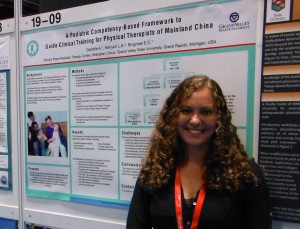 July 18, 2015
July 18, 2015
 Olivia's Place
Olivia's Place
 Comments Off
Comments Off
 April Gamble, KSA, physical therapy, WCPT, WCPT Congress 2015, World Confederation of Physical Therapy
April Gamble, KSA, physical therapy, WCPT, WCPT Congress 2015, World Confederation of Physical Therapy

Authored by April Gamble, Physical Therapist, Beijing, pictured here at the WCPT Congress 2015 in Singapore.
I had the opportunity to represent Olivia’s Place at the World Confederation of Physical Therapy (WCPT) Congress 2015 in Singapore. The WCPT serves as an international voice of physical therapy and seeks to move the physical therapy profession forward around the globe. It was thrilling to engage with therapists at the Congress from all over the world. There was such an immense air of excitement that only occurs when you bring people together for development within a shared passion. The WCPT Congress was also an excellent opportunity to share via a presentation, our recent efforts in the development of a Knowledge, Skills, and Abilities (KSA) Framework in the field of pediatric physical therapy.
The KSA Framework we have recently developed is made up of multiple documents to guide both locally trained and newly graduated physical therapists through a process of learning and developing their professional skills. We developed the KSA Framework based on current research, existing frameworks, and an extensive knowledge of China’s culture, training system, and educational needs. It will be used to support our mission of improving the standard of care in rehabilitation throughout China.
Lis Ringrose, Clinical Director and Physical Therapist, and April Gamble, Physical Therapist at Olivia’s Place, with the assistance and guidance of Lisa Kenyon, Associate Professor of Doctor of Physical Therapy Program at Grand Valley State University, Michigan (US), to ensure the content and approach are in keeping with international standards.
We are currently working on completing a KSA framework for pediatric occupational therapy and pediatric speech and language pathology. As well as using the frameworks internally with locally trained Chinese staff and newly graduated international staff, we are also making it available to individuals and organizations across China because we believe that the frameworks have the potential to facilitate improved care, which will positively influence the children and families of China.
